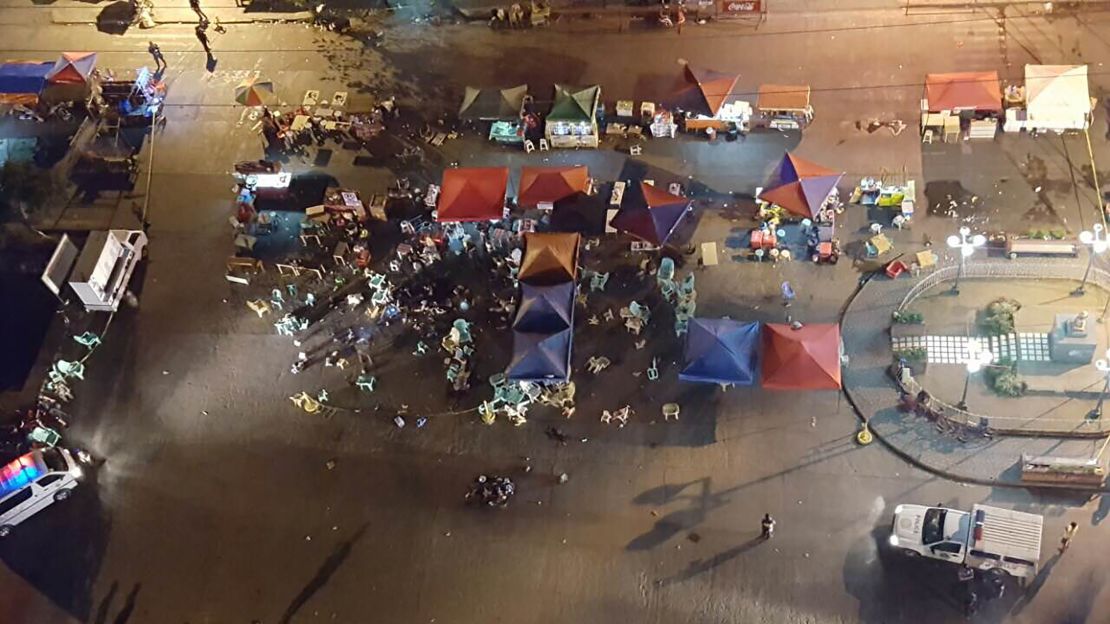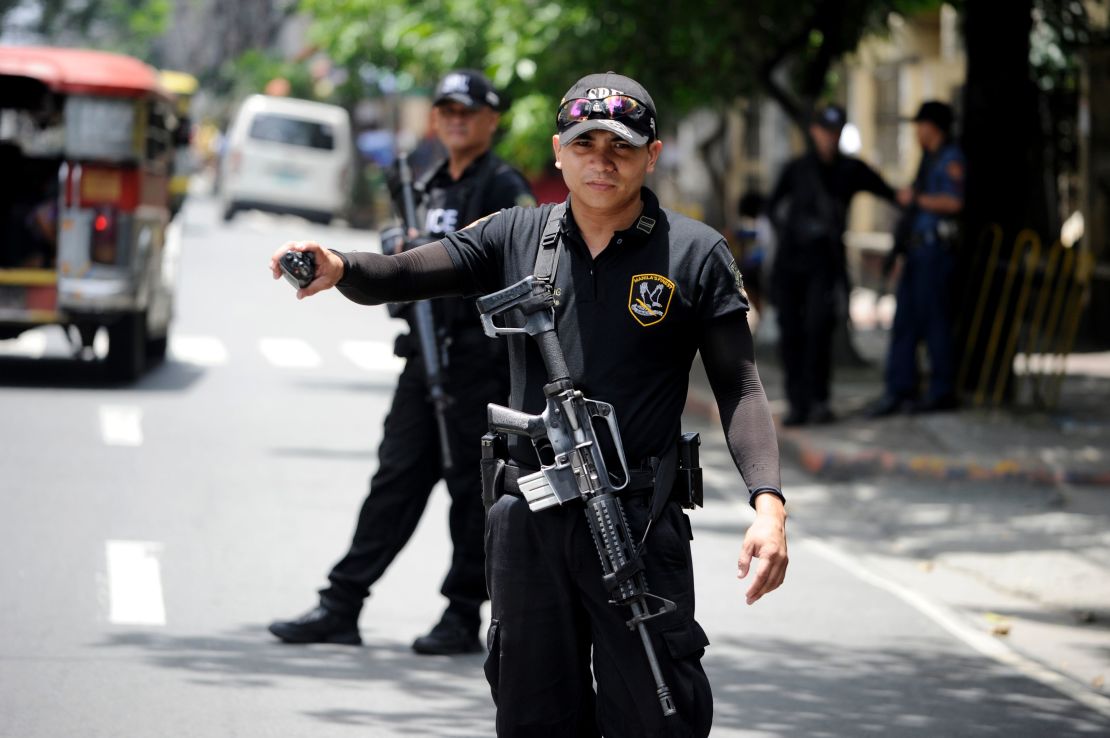Story highlights
United Nations issues condemnation
President declares country in "a state of lawless violence" and authorizes searches
IED made of mortar rounds caused blast, police say
Police in the Philippines are looking for a man and two women they want to question in connection with the blast at a crowded market in Davao City that killed 14 people.
National Police Chief Ronald dela Rosa told CNN on Saturday the blast late Friday was caused by an improvised explosive device made of mortar rounds – which pointed to extremist groups.
Escalating ISIS threat in Southeast Asia: Is the Philippines a weak link?
Dela Rosa told reporters in the southern Philippines city that authorities had eight witnesses, and a sketch of one suspect.
Sixty-eight people were injured at the crowded night market in President Rodrigo Duterte’s hometown, Dela Rosa said. Fifteen of the injured were in critical condition, CNN Philippines reported, citing Southern Philippines Medical Center director Leopoldo Vega.
Davao City Vice Mayor Paolo Duterte – the President’s son – said the city had received a bomb threat two days before the blast, CNN affiliate ABS-CBN reported.
Members of the UN Security Council called the attack “heinous” and “cowardly,” and said “those responsible for these killings should be held accountable,” according to a press statement issued on Sunday.
Islamists are uspected
On Saturday morning, during a visit to the blast site, Duterte told reporters that Islamist militants could be responsible.
“We are not new to this kind. It is always connected with the Abu Sayyaf or in Central Mindanao,” he said, according to a statement from his office.
“But this is not the first time that Davao City has been sacrificed in the altar of violence.”
He said he had warned the public that there could be blowback from intensified government military operations against the pro-ISIS Islamist group Abu Sayyaf in Sulu province, where 8,000 troops deployed in recent weeks.
“We have always been ready for this. I warned, I remember warning everybody that there could be a reprisal because of the pressure there in Sulu which is going on,” Duterte said.

Abu Sayyaf is a violent extremist group that split from the established Philippines separatist movement Moro National Liberation Front in 1991. The group, which remains outside the country’s sputtering peace process, has the stated aim of establishing an independent Islamic state on the southern island of Mindanao, on which Davao City is located.
The group first became active in the early 1990s and was responsible for bombings across the southern Philippines and in the Malaysian state of Sabah, and more recently has gained headlines for kidnapping and beheading Western hostages.
The Philippines is a predominantly Catholic country, with a large Muslim population in the south.
Abu Sayyaf: Islamist extremists or profiteering criminals?
‘State of lawlessness’
Duterte has described the attack as an act of terrorism, and declared the nation in “a state of lawlessness,” authorizing police and the military to search cars and frisk people at checkpoints.
The “state of lawlessness” is the mildest of the three executive powers the President can order, giving him the power to summon the military and work more closely with police, but falls short of being a declaration of martial law. The president can only impose martial law in case of invasion or rebellion, Duterte’s spokesman said.
“It’s not martial law but I am inviting now the Armed Forces of the Philippines, the military and the police to run the country in accordance with my specifications,” he said, according to CNN Philippines.
Duterte, who visited a morgue early Saturday to pay respects to the dead, said people should submit to searches and frisking at checkpoints for the sake of public safety.
“We know that this is not a fascist state. I cannot control the movement of the citizens of the city and every Filipino has the right to enter and leave Davao. It is unfortunate we cannot stop and frisk anybody for just any reason,” he said.
Police and military are on high alert across the country, and authorities have urged the public to be vigilant in case of further attacks.

Duterte’s war on drugs
Duterte, the longtime mayor of Davao City, has faced domestic and international criticism since taking national office for his hardline stance on suspected drug offenders.
Rodrigo Duterte promised to fight drug dealers
The Philippine Daily Inquirer’s “Kill List” – regarded as one of the most accurate records of the killings of suspected drug dealers by police and vigilantes – has recorded 832 deaths since Duterte assumed office June 30. Police say at least 239 drug suspects were killed in the three weeks after Duterte’s inauguration.
Duterte’s war on drugs leaves bodies in the street
‘I am really scared’
Leonor Rala, a 19-year-old medical technology student at San Pedro College, told CNN Friday night that she was terrified after the blast struck near her dorm.
She said she initially thought something had fallen on the roof of a neighboring building. She went down to survey the scene of the blast, about 100 yards from her dorm. Emergency teams were already in place.
“I am really scared to go out,” she said. “Some of my schoolmates are victims of the explosion and now dead.”
She continued: “We’re very terrified because Davao City was known to be the safest city in the Philippines and a situation like this is very rare.”
CNN’s Tim Hume reported and wrote from London, with journalist Maria Ressa reporting from Morong, Philippines. CNN’s Christina Zdanowicz, Philip Victor and Merieme Arif contributed to this report.















